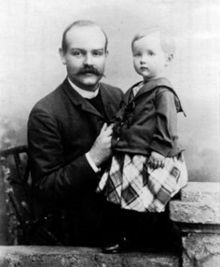Johannes Weiß (theologian)
Johannes Weiß (born December 13, 1863 in Kiel ; † August 24, 1914 in Heidelberg ) was a Protestant theologian who made significant contributions to the development of the historical-critical method and its application to the New Testament . White is considered to be the pioneer of the so-called history of form .
Life
Weiß, the son of the theologian Bernhard Weiß , studied in Marburg , Berlin , Göttingen and Breslau . He taught in Göttingen from 1890, in Marburg from 1895, and in Heidelberg from 1908, and with his discovery of the eschatological element, especially in the preaching of Jesus, he was one of the representatives of the school of religious history. His students include Rudolf Bultmann , who took up and continued his research on the history of forms in the New Testament, and Josef Hromádka . Of white among others, the term "Q" for the native sayings source , which, according to the two-source theory input in the Gospels according to Matthew and Luke has found.
From 1910 he was an extraordinary member of the Heidelberg Academy of Sciences .
Johannes Weiß found his final resting place in the Heidelberg Bergfriedhof in the family grave - Arnold and Rech / Müller, Guggler and Weiß - in the (Section L).
Fonts (selection)
- The Revelation of John. A contribution to the history of literature and religion , (FRLANT 3), Göttingen 1904.
- The sermon of Jesus about the kingdom of God , Göttingen 1892, 3rd edition 1964.
literature
- Gerhard Wolfgang Ittel : Primitive Christianity and Foreign Religions in the Judgment of the School of Religious History . Inaugural dissertation Erlangen, 1956, 39–41
- Klaus-Gunther Wesseling : WEISS, Johannes. In: Biographisch-Bibliographisches Kirchenlexikon (BBKL). Volume 13, Bautz, Herzberg 1998, ISBN 3-88309-072-7 , Sp. 659-666.
Web links
- Literature by and about Johannes Weiß in the catalog of the German National Library
- Entry on Johannes Weiß in the online edition of the Encyclopædia Britannica
Individual evidence
- ↑ Cilliers Breytenbach (ed.): Paulus, the Gospels and the early Christianity. Contributions from and to Walter Schmithals on his 80th birthday. Leiden 2004, pp. 342 f., ISBN 90-04-12983-9 .
- ^ Dorothea Neumärker: Josef L. Hromádka. Theology and Politics in the Context of Current Events . Chr. Kaiser Verlag, Munich 1974, ISBN 3-459-00907-1 , p. 38.
| personal data | |
|---|---|
| SURNAME | White, Johannes |
| BRIEF DESCRIPTION | Protestant theologian |
| DATE OF BIRTH | December 13, 1863 |
| PLACE OF BIRTH | Kiel |
| DATE OF DEATH | August 24, 1914 |
| Place of death | Heidelberg |
